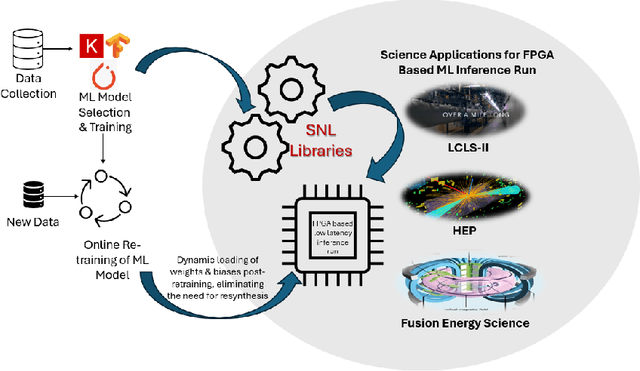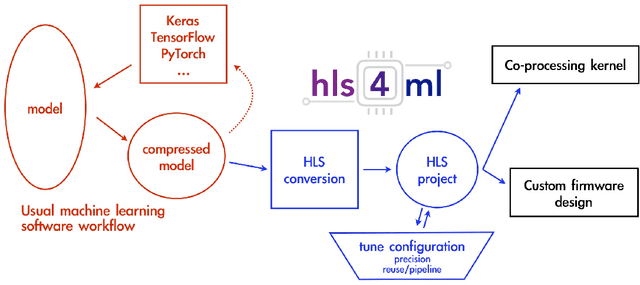Julia Gonski
Edge Machine Learning for Cluster Counting in Next-Generation Drift Chambers
Nov 16, 2025Abstract:Drift chambers have long been central to collider tracking, but future machines like a Higgs factory motivate higher granularity and cluster counting for particle ID, posing new data processing challenges. Machine learning (ML) at the "edge", or in cell-level readout, can dramatically reduce the off-detector data rate for high-granularity drift chambers by performing cluster counting at-source. We present machine learning algorithms for cluster counting in real-time readout of future drift chambers. These algorithms outperform traditional derivative-based techniques based on achievable pion-kaon separation. When synthesized to FPGA resources, they can achieve latencies consistent with real-time operation in a future Higgs factory scenario, thus advancing both R&D for future collider detectors as well as hardware-based ML for edge applications in high energy physics.
Convolutional Autoencoders for Data Compression and Anomaly Detection in Small Satellite Technologies
Apr 29, 2025Abstract:Small satellite technologies have enhanced the potential and feasibility of geodesic missions, through simplification of design and decreased costs allowing for more frequent launches. On-satellite data acquisition systems can benefit from the implementation of machine learning (ML), for better performance and greater efficiency on tasks such as image processing or feature extraction. This work presents convolutional autoencoders for implementation on the payload of small satellites, designed to achieve dual functionality of data compression for more efficient off-satellite transmission, and at-source anomaly detection to inform satellite data-taking. This capability is demonstrated for a use case of disaster monitoring using aerial image datasets of the African continent, offering avenues for both novel ML-based approaches in small satellite applications along with the expansion of space technology and artificial intelligence in Africa.
Building Machine Learning Challenges for Anomaly Detection in Science
Mar 03, 2025



Abstract:Scientific discoveries are often made by finding a pattern or object that was not predicted by the known rules of science. Oftentimes, these anomalous events or objects that do not conform to the norms are an indication that the rules of science governing the data are incomplete, and something new needs to be present to explain these unexpected outliers. The challenge of finding anomalies can be confounding since it requires codifying a complete knowledge of the known scientific behaviors and then projecting these known behaviors on the data to look for deviations. When utilizing machine learning, this presents a particular challenge since we require that the model not only understands scientific data perfectly but also recognizes when the data is inconsistent and out of the scope of its trained behavior. In this paper, we present three datasets aimed at developing machine learning-based anomaly detection for disparate scientific domains covering astrophysics, genomics, and polar science. We present the different datasets along with a scheme to make machine learning challenges around the three datasets findable, accessible, interoperable, and reusable (FAIR). Furthermore, we present an approach that generalizes to future machine learning challenges, enabling the possibility of large, more compute-intensive challenges that can ultimately lead to scientific discovery.
Analysis of Hardware Synthesis Strategies for Machine Learning in Collider Trigger and Data Acquisition
Nov 18, 2024



Abstract:To fully exploit the physics potential of current and future high energy particle colliders, machine learning (ML) can be implemented in detector electronics for intelligent data processing and acquisition. The implementation of ML in real-time at colliders requires very low latencies that are unachievable with a software-based approach, requiring optimization and synthesis of ML algorithms for deployment on hardware. An analysis of neural network inference efficiency is presented, focusing on the application of collider trigger algorithms in field programmable gate arrays (FPGAs). Trade-offs are evaluated between two frameworks, the SLAC Neural Network Library (SNL) and hls4ml, in terms of resources and latency for different model sizes. Results highlight the strengths and limitations of each approach, offering valuable insights for optimizing real-time neural network deployments at colliders. This work aims to guide researchers and engineers in selecting the most suitable hardware and software configurations for real-time, resource-constrained environments.
Embedded FPGA Developments in 130nm and 28nm CMOS for Machine Learning in Particle Detector Readout
Apr 26, 2024



Abstract:Embedded field programmable gate array (eFPGA) technology allows the implementation of reconfigurable logic within the design of an application-specific integrated circuit (ASIC). This approach offers the low power and efficiency of an ASIC along with the ease of FPGA configuration, particularly beneficial for the use case of machine learning in the data pipeline of next-generation collider experiments. An open-source framework called "FABulous" was used to design eFPGAs using 130 nm and 28 nm CMOS technology nodes, which were subsequently fabricated and verified through testing. The capability of an eFPGA to act as a front-end readout chip was tested using simulation of high energy particles passing through a silicon pixel sensor. A machine learning-based classifier, designed for reduction of sensor data at the source, was synthesized and configured onto the eFPGA. A successful proof-of-concept was demonstrated through reproduction of the expected algorithm result on the eFPGA with perfect accuracy. Further development of the eFPGA technology and its application to collider detector readout is discussed.
 Add to Chrome
Add to Chrome Add to Firefox
Add to Firefox Add to Edge
Add to Edge